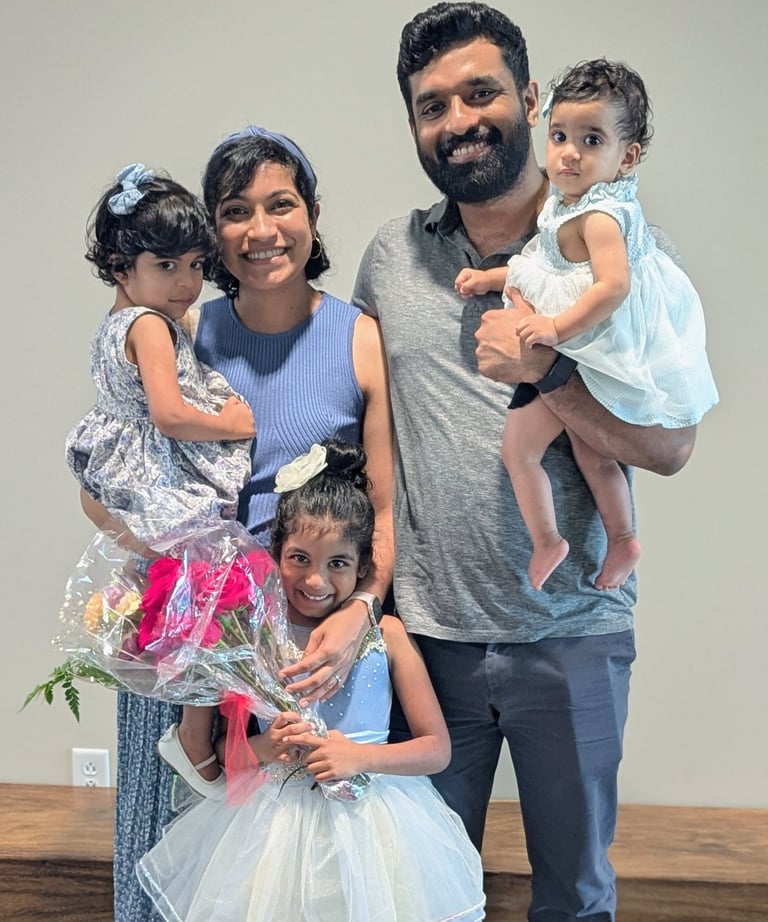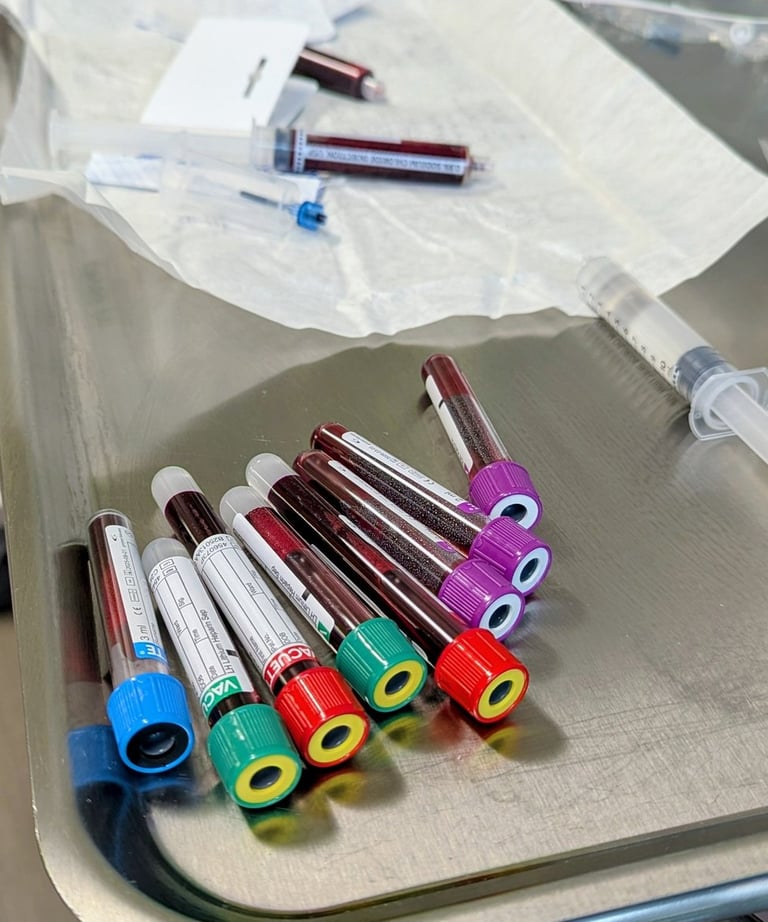
A Clear Scan and a Deeper Kind of Clarity
I got a clear scan and a negative MRD test! But this update isn’t just about the results—it’s about what healing has taught me about truth, presence, and asking the harder questions.
Blessy
6/13/20256 min read
When good news invites a deeper look
I’ve been holding this update close for a few days—not out of hesitation, but because it felt too meaningful to sum up with quick words.
The PET scan was clear.
The MRD test—negative.
Thank you, dear Jesus.
MRD stands for Minimal Residual Disease. It’s a blood test that looks for tiny fragments of cancer DNA—called circulating tumor DNA (ctDNA)—that may still be present in the bloodstream even when scans show no visible evidence of disease. For DLBCL, this kind of test can catch molecular signs of cancer earlier and with more sensitivity than imaging alone. At first, I thought of my relapse as something that was “gone” and had returned. But the truth is, the cancer never fully left. It just sank beneath the surface—undetected, but still active.
That thought has stayed with me.
How something so serious can remain hidden until the moment it isn’t. And the more I’ve sat with it, the more I see how this same pattern shows up all around us.
In families.
In culture.
In what we believe and how we live.
Ever since becoming a mother, I’ve started viewing the world differently—through the lens of my children’s future. What kind of life will they live? What kind of truth will they be taught? What will they be asked to value? And how much of that will reflect what God intended for His children versus what society has passively handed down?
So many of the deep issues we face today didn’t just appear. They were planted years ago—small, quiet compromises that went unnoticed. And over time, they grew. Slowly, silently. Until suddenly, they weren’t ignorable anymore.
We live in a world full of comfort and abundance. Yet somehow, true peace and joy feel harder to find. People are more anxious, more restless, more confused about what matters. There’s a subtle ache beneath all the motion, and rarely do we stop long enough to ask: Where is this coming from?
What You Can’t See Still Matters
I didn’t expect the MRD test to feel this significant. The PET scan already said I was in remission. That felt like enough. But something about MRD—going just a little further—made me think about how I should think this way with other aspects of my life.
This latest test made me think how easy it is to live on autopilot—to accept inherited ideas or norms simply because that’s how it was done, not because they’ve been questioned or found true. It seems like there’s a temptation to stay in the shallow end in conversations or relationships to fit into cultural expectations.
I’ve seen how asking deeper questions—about meaning, values, purpose—can make people uncomfortable. Not because the questions are unkind, but because they reveal the space between what’s said and what’s lived. They invite us to reconsider. And that can be disorienting if we’ve spent a long time not noticing.
But maybe asking isn’t a threat. Maybe it’s an act of love. Maybe it’s the very thing that helps us wake up. I notice the effects all around us when deep questions go unasked for too long. Conversations become fragile. Depth is avoided. The idea of truth starts to feel heavy instead of freeing.
And maybe that’s why some relationships ache—not because of conflict, but because they never reach the depth our hearts were made for.
I feel a longing for a culture where we feel safe enough to wonder out loud. To ask hard things with humility. To let go of ideas not rooted in truth.
Please hear my heart in this: I’m not writing as someone who’s figured it all out. I say it because I’m learning—often painfully—what actually matters. And I’m trying to live a life that reflects that. I know what it feels like to live on the surface. But life has a way of waking you up—sometimes gently, sometimes not.
Motherhood does it.
Loss does it.
Illness does it.
And once I started seeing things more clearly, it became hard to unsee.
Learning to Trust the Unfolding
I'm still undergoing treatment. I have three more rounds of chemo. Seven more bispecific infusions. We’re not at the finish line yet. But today, we’re breathing easier. And we’re thanking God not just for a clean scan, but for clarity.
The treatment I’m currently on is relatively new. There isn’t long-term data yet to say with certainty whether it’s curative. So we’re walking this out one day at a time. Just last week, updated results showed that around 70% of patients who achieved remission remain cancer-free two years later. That’s a hopeful number.
When I found out I wasn’t eligible for CAR T-cell therapy, it stung. It felt like we were venturing into the unknown. But this new approach is proving more promising than I expected—comparable in effectiveness to CAR T, which gives us real reason to hope.
Because I’m MRD negative, my doctor and I may discuss the possibility of a “watch and monitor” approach after treatment instead of heading straight into stem cell transplant. That kind of space—after months of intensity—would be a gift.
This time around, I feel stronger. Physically, yes. But emotionally too. More anchored. More hopeful.
DLBCL comes in many forms. Some types respond very well to treatment. Others—like the one I have—are more resistant. Mine is a less common subtype called ABC triple expressor, which is often harder to treat with standard chemotherapy. It has built-in survival pathways that make relapse more likely. So, when the cancer came back, it wasn’t entirely a surprise.
During one of my overnight hospital stays, I spoke with an attending doctor I hadn’t met before. I later learned he was deeply involved in research. He shared that, based on current data, CAR T-cell therapy might have offered about a 40% chance of long-term survival. But that my current treatment is not considered curative yet—but will buy time.
Well dang.
I understood what he meant. Statistics have their place. But I also believe that God works beyond numbers, timelines, and predictions.
Now that I’m in remission—which is huge achievement—my odds are likely much better. And with every clear scan, that hope deepens. The longer remission holds, the more the odds continue to shift in my favor.
What encourages me now is that this treatment doesn’t rely on chemo alone. It primarily uses immunotherapy to bring my own T cells face-to-face with the B cells—healthy and cancerous alike—and pushes them to act. And it isn’t hindered by the same limitations that made past treatments less effective for my subtype.
Usually, the first round of treatment is your best shot. If you relapse within a year, the odds go down significantly. Without CAR-T survival is usually measured in months. That’s the hard truth. So for me to be here—responding well, with no sign of disease in the blood, and finally on a therapy that’s aligned with my biology.
And I don’t take that lightly. This could look very different. And I carry deep gratitude for how things are unfolding.
A Final Thought
My hope is that I continue to see how closely healing and truth are tied together—that going deeper, whether in medicine or in my interior life, isn’t something to fear, but something to welcome.
This journey has reminded me: depth brings clarity. Honesty brings freedom. And I don’t have to be afraid of what I’ll find—because God is already there, waiting for me in the places I’ve been too busy or too afraid to look.
Maybe that’s the quiet invitation underneath it all: not just to heal, but to wake up.
If You Feel Led to Pray
For continued remission and protection as I finish the remaining three rounds of chemo and seven bispecific infusions—that every last trace of cancer would be gone and stay gone.
For wisdom and clarity during my next doctor’s appointment, as we explore the possibility of a “watch and monitor” approach.
For strength in body and peace in mind as I continue walking this path—that I would stay rooted in truth and not fear statistics or uncertainty.
For a dear friend who recently received a serious and unexpected health diagnosis. Please pray for her and her sweet family—for hope, strength, clarity in treatment decisions, and complete healing.
For our culture and families—to have the courage to ask deeper questions, to embrace truth, and to live from a place of presence and purpose.
With strength and blessings,
Blessy





